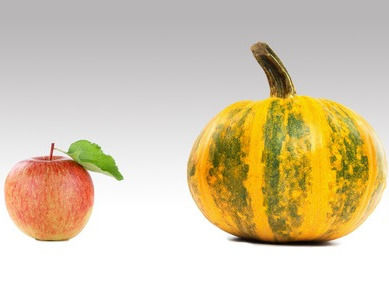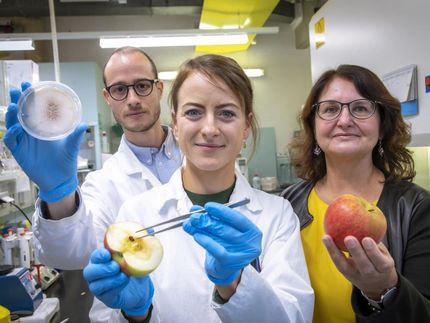Of apples and oil pumpkins: News from microbiome research
On the trail of the universal apple microbiome
The extent to which the composition of the microbiome of apples and oil pumpkins depends on the geography of the location and what insights can be derived from this for breeding, health and shelf life of the fruits is shown in two recent publications by researchers at TU Graz.

Of apples and oil pumpkins: News from microbiome research
TU Graz
The microbiome is the community of microorganisms that exist in or on all organisms, including bacteria and fungi. A team from the Institute of Environmental Biotechnology at TU Graz led by Gabriele Berg has now investigated the microbiomes of apples and oil pumpkins in two independent studies. The researchers have found out that bacteria that are useful for plants are largely "inherited", i.e. passed on to the next generation, while the community of fungi in the microbiome is strongly dependent on the respective soil microbiome and thus on the location.
Microbiome-controlled breeding of oil pumpkins
Breeding of the Styrian oil pumpkin is relatively young with about 150 years and well documented. Through selective breeding of resistant, increasingly tasty and high-yielding pumpkin plants, the seed microbiome of the oil pumpkin has changed along with the generations. Using a well-documented breeding line, the environmental biotechnologists at TU Graz were able to demonstrate for the first time that the microorganisms on the seed of the pumpkin are inherited and probably decisive for certain plant characteristics. Peter Kusstatscher, one of the study authors, explains: "We studied bacteria and fungi on the seeds of oil pumpkins and found out that the plant passes on a large part of its bacteria on the seed - up to 60 percent in fact - to the next generation, while the fungal diversity on the seed largely depends on the local soil microbiome. Kusstatscher continues: "The microorganisms that are passed on are mainly those that are useful for the plants. In this respect, plants behave in a similar way to humans: Babies also receive their microbiome from their mothers."
The results, published in Frontiers in Plant Science, pave the way for the first time towards microbiome-controlled breeding of oil pumpkins. Targeted breeding of a beneficial seed microbiome results in plant traits that have a positive impact on yield, health and storability of oilseed squash.
Tracking down the universal apple microbiome
Apples are among the most popular and widely consumed fruits worldwide. Fruit quality, yield security and the storage life of apples play a major role for fruit growers, the fruit trade and for consumers. In a worldwide study, the apple of the variety "Royal Gala" was examined for the first time with regard to the composition and possible local differences of its microbiome on and in the apple fruit. An international team was able to show that the composition and structure of the fungal and bacterial communities of the apple vary from region to region at the time of harvest maturity, i.e. that they are strongly dependent on the geographical location and thus on the prevailing climatic conditions and management practices. In particular, the fungal diversity of the fruit is significantly site dependent and suggests a link to the type and incidence of postharvest diseases. Ahmed Abdelfattah, Marie Curie Postdoctoral Fellow at the Institute of Environmental Biotechnology at Graz University of Technology and first author of the study explains: "Despite all the regional differences in the microbiome community of the 'Royal Gala' apple, we were able to identify a so-called 'core' microbiome in a global comparison, which fruits all over the world have in common. This global 'core' microbiome is represented by several useful microbial indicators and makes up a good portion of the fruit's microbial community."
Similar to the study results on oil pumpkin, this study lays another foundation for new approaches to improving fruit quality and health, in this case of apple. Further, the results form the basis for studies of complex microbial interactions on the surface of apple fruit. The study results were published in Environmental Microbiology.
Both studies underline the importance of the microbiome for health issues from the crop in the agroecosystem to the human who consumes the food. At the same time, they open up new avenues for microbiome management for environmentally friendly control of harmful pathogens.
This research area is anchored in the Field of Expertise "Human & Biotechnology", one of five strategic research foci of TU Graz.
Note: This article has been translated using a computer system without human intervention. LUMITOS offers these automatic translations to present a wider range of current news. Since this article has been translated with automatic translation, it is possible that it contains errors in vocabulary, syntax or grammar. The original article in German can be found here.




























































